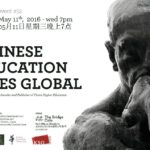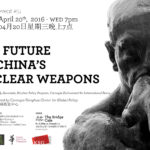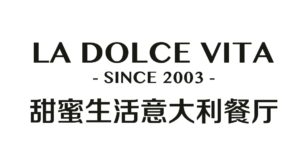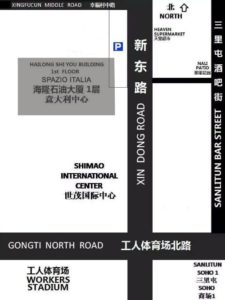-
18 Oct
#55 – Instability in North Africa and Middle East: a global threat?
event #55, Tuesday, October 25th, 2016
SPEAKERS
Yahia H. ZOUBIR, Professor of International Relations & International Management, Director of Research in Geopolitics, Kedge Business School
GONG Zheng 龚正, Assistant Researcher, China Institutes of Contemporary International Relations
ABSTRACT
Five years after the start of the so-called Arab Spring in North Africa, the region still faces some challenges. Tunisia, the most promising model, is undergoing an uncertain transition. Not only are the socio-economic and political conditions rather worrisome, but the country’s security situation is threatened by events in Libya, following the destruction of that country by NATO. Libya today is a failed state with 2 governments and where the Islamic State seized large swathes of the territory, in which in addition to local militias various foreign terrorists can train, even if IS is being defeated. Algeria has been at the forefront of the war on terrorism in the region, but its domestic situation faces various challenges. The drop in oil prices, unemployment among the youth, and the problems of succession have created conditions for a potential disturbance. Morocco, in spite of seeming stability, is also suffering from unpredictable socio-economic and political conditions. The problems of the region have been aggravated by the continued war in Mali in spite of France’s intervention in 2013. Furthermore, the absence of Maghreb integration has added to an already complex situation. In this context, Western meddling in Libya has also aggravated the conditions.
The emergence of these new trends in the geopolitics of the MENA region – particularly the slow demise of IS and the escalating power competition between the US and Russia – will have an historic impact on the future order of this region.
The world will see a new MENA in which the non-state actors will play a more prominent role.
Prof. Zoubir will provide an analytical review of the hard security in general while providing an analysis of the security challenges faced by each of the Maghreb countries, with particular focus on the threat represented by Al-Qaida in the Islamic Maghreb, the Islamic State, and other terrorist organizations and how the Maghreb states have responded to those threats. He will draw from his extensive research on the subject, as well as many interviews with officials, academics, and journalists from the region. His main argument is that globalization and foreign interventions have resulted in the emergence of transnational actors (such as narco-terrorism) who have challenged the existing order, marked by bad governance and socioeconomic disparities.
The current pattern to protect China’s regional interests is also facing new uncertainties.
Mr Gong will present his analysis of the terrorism threats posed by MENA with special focus on China’s security concerns – and its future role in the region.
Related Posts
- 10000
 Yahia H. ZOUBIR, Professor of International Relations & International Management, Director of Research in Geopolitics, Kedge Business School Dr. Yahia H. Zoubir is Professor of International Relations and International Management, and Director of Research in Geopolitics at KEDGE Business School, Marseille, France and currently Visiting Professor at PKU. Prior…
Yahia H. ZOUBIR, Professor of International Relations & International Management, Director of Research in Geopolitics, Kedge Business School Dr. Yahia H. Zoubir is Professor of International Relations and International Management, and Director of Research in Geopolitics at KEDGE Business School, Marseille, France and currently Visiting Professor at PKU. Prior… - 10000
 GONG Zheng 龚正, Assistant Researcher, China Institutes of Contemporary International Relations Gong Zheng us an assistant researcher of the Institute of Middle East Studies at China Institute of Contemporary International Relations (CICIR). He joined CICIR in 2011, focusing on Israel-Palestiniana relations, Syrian crisis, the politics of Jordan and Lebanon.…
GONG Zheng 龚正, Assistant Researcher, China Institutes of Contemporary International Relations Gong Zheng us an assistant researcher of the Institute of Middle East Studies at China Institute of Contemporary International Relations (CICIR). He joined CICIR in 2011, focusing on Israel-Palestiniana relations, Syrian crisis, the politics of Jordan and Lebanon.… - 10000October 25th, 2016 Instability in North Africa and Middle East: a global threat? Supplementary material Zoubir, Yahia H. 2012. Qaddafi's spawn. What the dictator's demise unleashed in the Middle East. Foreign Affairs, available here Zoubir, Yahia H. 2012. The Sahara-Sahel Quagmire: Regional and International Ramifications. Mediterranean Politics, 17:3, 452-458.…
- 10000Speakers: Yahia H. Zoubir, Professor of International Relations & International Management, Director of Research in Geopolitics, Kedge Business School >>Read more... Gong Zheng 龚正, Assistant Researcher, China Institutes of Contemporary International Relations >>Read more... VIDEO: Prof. Zoubir speaks passionatly post-event on the current trajectory of North Africa In the evening…
- 10000
 Following his outstanding talk at ThinkIN China #55, Professor Zoubir gave us this brilliant, impassioned appraisal of the situation in North Africa. Photos from the event are up on our Facebook page. Stay tuned this week for more coverage of our recent events, including the podcast and full event report…
Following his outstanding talk at ThinkIN China #55, Professor Zoubir gave us this brilliant, impassioned appraisal of the situation in North Africa. Photos from the event are up on our Facebook page. Stay tuned this week for more coverage of our recent events, including the podcast and full event report…
Read more... -
18 Oct
GONG Zheng
GONG Zheng 龚正, Assistant Researcher, China Institutes of Contemporary International Relations
Gong Zheng us an assistant researcher of the Institute of Middle East Studies at China Institute of Contemporary International Relations (CICIR). He joined CICIR in 2011, focusing on Israel-Palestiniana relations, Syrian crisis, the politics of Jordan and Lebanon. He received his MA in International Politics at Peking University.
Read more... -
17 Oct
Yahia H. ZOUBIR
Yahia H. ZOUBIR, Professor of International Relations & International Management, Director of Research in Geopolitics, Kedge Business School
Dr. Yahia H. Zoubir is Professor of International Relations and International Management, and Director of Research in Geopolitics at KEDGE Business School, Marseille, France and currently Visiting Professor at PKU. Prior to joining KEDGE in September 2005, he was Managing and Academic Director of the US Campus, Thunderbird Europe, France. He has also been international visiting faculty in numerous universities and business schools for the last 30 years, notably in China (Renmin University, Shanghai Jiatong University, and Shanghai University of Finance and Economics), the United States, European and Asian countries.
He has published more than a hundred scholarly works, including books, articles, and book chapters in international politics, foreign policy, governance, and security issues. His recent works include, North Africa Politics: Change and Continuity (2016); Building a New Silk Road: China and the Middle East in the 21st Century (2014), “The Eagle’s Nest in the Horn of Africa: US Military Deployment in Djibouti and the Dynamics of its Evolution,” (2016), “Algeria after the Arab Spring,” Foreign Affairs, (February 2016), “China’s Economic Diplomacy towards the Arab Countries: Challenges Ahead?” in the Journal of Contemporary China (2015), and “China’s Response to the Revolts in the Arab World: A Case of Pragmatic Diplomacy,” Mediterranean Politics (2014); “From Hard Military Bases to Soft Military Presence: US Military Deployment in Iraq Reassessed,” Journal of Middle Eastern and Islamic Studies (in Asia), 2012.
In addition to his publications, Dr. Zoubir attends regularly major international conferences organized by academic institutions and international and regional organizations. His most recent presentations include: “US Policy in the Maghreb” (Shanghai international conference); “Tunisia’s Security: The Democratic Transition’s Achilles Heel,” Denver, Colorado; “Middle Eastern and North African Perceptions of East Asia,” (International Symposium on China-Japan-Korea Relations with the Middle East, Shanghai); “The Tacit Alliance: China and Algeria in the New Era,” (Keynote Speaker, Shanghai); “China-Maghreb Relations,” (Shanghai); “The Changing Nature of North African Terrorism,” NATO Center of Excellence/Defense against Terrorism (CEO-DAT), Ankara, Turkey; “Transnationalism and Transition: The Changing Dynamics of the North African Security Context,” NATO Center of Excellence/Defense against Terrorism; “The Crisis in Northern Mali: Overlapping Agendas,” Al Jazeera Center for Studies, Doha, Qatar). He has also given lectures at universities and military academies, such as NATO College in Rome or the National Defense Academy, Center for Security & Strategic Research, in Riga, Latvia, and at the African Union. In addition, he has presented studies to a number of Chinese Universities and think-tanks.
Dr. Zoubir has served as consultant for governments and companies in China, the United States, Mexico, Iran, as well as in countries in Africa and Europe. He serves on various editorial boards of academic journals both in politics and business (Journal of Middle Eastern and Islamic Studies [China], Journal of North African Studies…).
His interviews on a numerous international peace and security issues have appeared in newspapers and magazines, and broadcast in China, the United States, India, and African and European countries.
He is a member of more than ten academic associations, such as the American Institute of Maghreb Studies (AIMS); Association des universitaires algériens pour la promotion des études de sécurité nationale [ASNA], founding member; Association of Third World Studies; International Studies Association; Middle East Studies Association; Society for Algerian Studies (University of London), Chatham House, among others. He is a member of renowned academic and professional networks, such as EuroMeSCo.
Read more... -
04 Oct
#53 Event Report – Cheap Oil and China’s Energy Strategy
June 8th, 2016 Bridge Cafe (Wudaokou)
Speaker:
CUI Shoujun 崔守军, Associate Professor and Assistant Dean at the School of International Studies, Renmin University of China.
Presentation
The global energy landscape has been undergoing rapid and radical change. Following the United States’ shale revolution, the economic slowdown of Asia’s energy-hungry powerhouses, and the worldwide political pledges made toward the achievement of ambitious environmental goals, the downward pressure on oil prices continues unabated.
Faced with a fossil fuel industry swamped by excess supply, China is building up its Strategic Petroleum Reserve in a bid to grow more resilient to potential disruptions. At the same time, the profound implications that the industry’s busts have brought upon the world’s largest oil exporters – from Russia, to Venezuela and Angola – are now leading China to continuously reshape its energy strategy across the Middle East, Subsaharan Africa, and Latin America.
Providing a complete assessment of China’s energy strategy, Renmin University’s Cui Shoujun touched upon issues of security of demand and supply, and the impact oil prices have on the long-term economic stability of the world’s largest fossil fuel producers and consumers. Overall, Cui challenged assumptions which view China’s “loan-for-oil” strategy as effective for Beijing’s sustained economic development, also questioning the forecasts of oil bears, who envision prices plummeting below $40 per barrel of crude – a scenario which would “bring the industry to its knees”, Cui noted.
Professor Cui’s initial considerations pertained to the current price of crude oil. At present, while Brent crude is traded at $47 per barrel, the price of WTI (NYMEX) crude is stable at around $45 per barrel. These prices have been in free-fall since September 2014, now becoming unsustainably low for countries where the production of one barrel of crude exceeds $35. Examples include Russia, Brazil, Canada, and the United States, where arctic oil production, offshore oil extraction, tar sands processing and shale oil production have become less profitable endeavors.
The same cannot be said for countries such as Saudi Arabia and Kuwait, where the production costs of Arab Light Crude have been consistently lower than $10. Yet, Professor Cui noted that the oil-rich kingdom of Saudi Arabia has already shown signs of dramatic economic distress. In May 2016, the foreign assets of the Saudi Arabian Monetary Agency (SAMA) reached a four-year low, declining to $572 billion. Meanwhile, Riyad’s fiscal break-even price per oil barrel dropped to $86 dollars (from $94.5 in 2015), as the kingdom adjusted to the slump in crude triggered by OPEC countries fighting for market shares.
How is China reacting to oil price slumps, then? Professor Cui noted that Beijing has taken advantage of the current state of the energy landscape to fill up its strategic and commercial oil reserves. In non-traditional security terms, China is currently seeking to enlarge its stockpile up to the levels of IEA members such as the United States, Germany, and Japan, with backup oil reserves worth 150 days. “Beijing has never bought more oil today in its history, while crude continues being traded below $50. Thus, no correlation exists between recent oil price spikes and China’s sustained energy demands”, Cui added.
With regards to its commercial reserves, Beijing started importing 6.2m crude oil barrels per day (bpd) in 2014 to sustain an overall daily consumption of 10.3m bpd. Out of these imported 6.2m bpd, 3m came from the Middle East and the Gulf, while 1m originated from Saudi Arabia. To further strengthen its ties to the region, in 2004 China initiated talks with the Gulf Cooperation Council (GCC) for the establishment of a free trade agreement, alongside setting up the China-Arab States Cooperation Forum (CASCF). Today, the Middle East is consistently featured as an area of heightened interest in policy papers describing the future of China’s One Belt One Road initiative (OBOR). To continue fostering its relationship with the region without over-relying on Gulf oil, Beijing has also gone at great lengths to establish partnerships with other oil producers. Yet, China’s oil supply diversification efforts do not appear to have been particularly successful.
Over the past few years, in fact, China has implemented “loan-for-oil” measures across Africa, Asia and Latin America, bringing Venezuela, Angola, and Kazakhstan at the heart of its most pressing interests. Due to falling oil prices, these countries now find themselves with dwindling amounts of oil to sell back to Beijing. According to an estimate by professor Cui, China has already sunk over $60 billion in the crumbling Venezuelan economy, and $40 billion is outstanding. A similar scenario concerns Angola, where the local government struggles with the repayment of roughly $25 billion of debt to China. In either country, cases of triple-digit annual inflation and shortages of food and medicine have left China with no choice other than maintaining great flexibility with its debtors, and hope for oil prices to rebound.
…With one caveat, however. According to Cui, here lies China’s greatest energy conundrum. While soaring oil prices would allow China’s greatest debtors to pay back their outstanding loans, these could at the same time create greater sources of tension across the Middle East. Drawing on Benjamin Smith’s work, professor Cui argued: “when oil prices are low, oil producers become the most stable”. Interregional disruptions would exacerbate also from downward trends in the prices of crude oil. Thus, what professor Cui most hopes for the future of China’s energy strategy is for the price of crude to be maintained, first and foremost, stable.
Q&A:
Addressing a question on the potential tensions that could spark between China and the United States along China’s maritime oil choke points, professor Cui recalled how the world’s greatest oil giants have placed great emphasis on the upcoming eighth session of the China-U.S. Strategic and Economic Dialogue, scheduled for June 2016. He also warned against focusing too heavily on China’s vested interests on said choke points, noting how the oil and gas imports of ROK and Japan, too, depend on the safety of navigation maintained along the straits of Hormuz and Malacca.
Further elaborating on how risky it is for China’s major state banks to denominate their loans to African countries in oil, iron, and ore, rather than in currency, professor Cui observed that said banks, albeit being momentarily concerned with swamping oil prices, are generally not worried with the consequences that could derive from having debt denominated in other mineral resources. The commodity prices for metals and minerals undergoes 7-to-8 year cycles. Any backdrop, therefore, is not only temporary, but expected and constantly monitored. Quoting IMF data on how the world’s eight fastest growing economies are from the African continent, Cui mentioned China’s confidence in the continuous growth of its long-standing diplomatic partner.
Last but not least, responding to another question on whether the Chinese government intends to release the untapped economic potential of Guyana (where 15 billion barrels of proven crude reserves have been discovered), professor Cui mentioned the policy decision making power of China’s three oil giants: Sinopec, CNPC, and CNOOC. The moment any of China’s giants will awaken and show interest in Guyana, the government will then take the necessary steps to further diversify its oil supplies throughout South America.
Written by Carlotta Clivio
Related Posts
- 10000
 CUI Shoujun 崔守军, Associate Professor and Assistant Dean at the School of International Studies, Renmin University of China, Beijing. Dr CUI Shoujun is the Director of the Center for Latin America Studies and Executive Director of the Center for Middle East and Africa Studies at Renmin University of China, Beijing.…
CUI Shoujun 崔守军, Associate Professor and Assistant Dean at the School of International Studies, Renmin University of China, Beijing. Dr CUI Shoujun is the Director of the Center for Latin America Studies and Executive Director of the Center for Middle East and Africa Studies at Renmin University of China, Beijing.… - 10000
 event #53, Wednesday, June 8th, 2016 Speaker CUI Shoujun 崔守军, Associate Professor and Assistant Dean at the School of International Studies of Renmin University of China, Beijing. ABSTRACT Over the past few years, China has grown increasingly dependent on oil imports from the Middle East, Africa and Latin America.…
event #53, Wednesday, June 8th, 2016 Speaker CUI Shoujun 崔守军, Associate Professor and Assistant Dean at the School of International Studies of Renmin University of China, Beijing. ABSTRACT Over the past few years, China has grown increasingly dependent on oil imports from the Middle East, Africa and Latin America.… - 10000June 8th, 2016 Cheap Oil & China’s Energy Strategy Supplementary material Cui, Shoujun. 2015. Sino-Gulf Relations: from Energy to Strategic Partners. InFocus Quarterly. Available here. Cui, Shoujun. 2015. Belt and Road: China's Aspiration and a New Asia-Africa Partnership Network. The Review of Northeast Asian Studies vol.7 no.2. Available here. Cui,…
Read more... -
15 Sep
#54 – Reading list
September 21st, 2016
The Future of Sino-Russian Energy Ties
Supplementary material
- Wang, Tao and Rachel Yampolsky. 2015. Will China and Russia’s Parternship in Central Asia Last? The Diplomat, available here
- Gabuev, Alexander and Greg Shtraks. 2016. China’s One Belt, One Road Initiative and the Sino-Russian Entente. National Bureau of Asian Research, available here
- Trenin, Dmitri. 2015. From Greater Europe to Greater Asia? The Sino-Russian Entente. Carnegie Moscow Center, available here
Related Posts
- 10000
 event #54, Wednesday, September 21st, 2016 Speaker WANG Tao, 王韬 Assistant Director, Yicai Research Institute; Nonresident Scholar, Carnegie-Tsinghua Center for Global Policy. ABSTRACT China used to call Russia, or the former USSR, the “Old Brother”, but not anymore. The most recent self-claimed title of Russia is an “Elder Sister” of…
event #54, Wednesday, September 21st, 2016 Speaker WANG Tao, 王韬 Assistant Director, Yicai Research Institute; Nonresident Scholar, Carnegie-Tsinghua Center for Global Policy. ABSTRACT China used to call Russia, or the former USSR, the “Old Brother”, but not anymore. The most recent self-claimed title of Russia is an “Elder Sister” of… - 10000
 WANG Tao 王韬 Assistant Director, Yicai Research Institute; Nonresident Scholar, Carnegie-Tsinghua Center for Global Policy Dr. Tao Wang has been the Assistant Director of CBNRI since January 2016, heading the Institute’s energy research program and Beijing office. Dr. Wang along with his team seeks to provide independent, objective, and insightful suggestions…
WANG Tao 王韬 Assistant Director, Yicai Research Institute; Nonresident Scholar, Carnegie-Tsinghua Center for Global Policy Dr. Tao Wang has been the Assistant Director of CBNRI since January 2016, heading the Institute’s energy research program and Beijing office. Dr. Wang along with his team seeks to provide independent, objective, and insightful suggestions…
Read more... -
15 Sep
WANG Tao
WANG Tao 王韬 Assistant Director, Yicai Research Institute; Nonresident Scholar, Carnegie-Tsinghua Center for Global Policy
Dr. Tao Wang has been the Assistant Director of CBNRI since January 2016, heading the Institute’s energy research program and Beijing office. Dr. Wang along with his team seeks to provide independent, objective, and insightful suggestions to China’s historic transition in economy and energy what is unfolding now. Prior to joining CBNRI, Dr. Wang has been a resident scholar from 2012 to 2015 at Carnegie-Tsinghua Center for Global Policy, where he led the research on China’s unconventional oil and gas policies and the environmental implications. Before that, from 2009 to 2011, he worked at the Climate and Energy Program of WWF China and headed projects related to climate negotiation progress, emission and energy scenario analysis, as well as major business projects of low carbon innovation in start-ups. From 2006 to 2009, as a research fellow at both Tyndall Centre for Climate Change Research and Sussex Energy Group at University of Sussex in the UK, he worked with colleagues from 6 other university partners on scenario analysis of China’s future energy transition.
Related Posts
- 10000
 event #54, Wednesday, September 21st, 2016 Speaker WANG Tao, 王韬 Assistant Director, Yicai Research Institute; Nonresident Scholar, Carnegie-Tsinghua Center for Global Policy. ABSTRACT China used to call Russia, or the former USSR, the “Old Brother”, but not anymore. The most recent self-claimed title of Russia is an “Elder Sister” of…
event #54, Wednesday, September 21st, 2016 Speaker WANG Tao, 王韬 Assistant Director, Yicai Research Institute; Nonresident Scholar, Carnegie-Tsinghua Center for Global Policy. ABSTRACT China used to call Russia, or the former USSR, the “Old Brother”, but not anymore. The most recent self-claimed title of Russia is an “Elder Sister” of…
Read more... -
15 Sep
#54 – The Future of Sino-Russian Energy Ties
event #54, Wednesday, September 21st, 2016
Speaker
WANG Tao, 王韬 Assistant Director, Yicai Research Institute; Nonresident Scholar, Carnegie-Tsinghua Center for Global Policy.
ABSTRACT
China used to call Russia, or the former USSR, the “Old Brother”, but not anymore. The most recent self-claimed title of Russia is an “Elder Sister” of China, which tries to reflect a position that is weaker in power yet respectfully senior, nor is this accepted by China. Whatever comfortable term these two nations will eventually choose aligning their respective positions, it is undoubted in others eye that the “rapprochement” between Moscow and Beijing is one of the most notable trends in the global politics since 2014, and has the potential to significantly change the gravity of geopolitics in North and Northeast Asia.
The energy tie between China and Russia reflects their mutual demands of cooperation in political, security and economic dimensions. Therefore it cannot be viewed from only one of them. For both nations, the opaque decision making process in their governments, as well as in their powerful NOCs may not always ensure good communication and understanding, sometimes they may even be at odds in their own interests. So distrust will always find place between Beijing and Moscow. Uncertainty in the progress of China’s economic transition and SOE reform, and the energy technology development in the next few years may also lead to very different future scenarios that could either further strengthen or destruct the energy tie between China and Russia. But in the next years to come, the world should not be surprised if there were more energy deals signed between the two.
This event is organized in partnership with:
Carnegie-Tsinghua Center for Global Policy – 清华-卡内基全球政策中心
The Carnegie–Tsinghua Center for Global Policy brings together leading policy experts and practitioners from China and around the world to engage in collaborative dialogue and research. From its platform at Tsinghua University, the center works to identify constructive solutions to common global challenges. The Carnegie–Tsinghua Center is also part of Carnegie’s well-established Asia Program, which provides clear and precise analysis to policy-makers on the economic, security, and political developments in the Asia-Pacific region.The Carnegie–Tsinghua Center works with Carnegie’s other global centers to host conferences, roundtables, seminars, and closed-door briefings and to publish timely and incisive analysis on the most pressing global issues, including international economics and trade; energy and climate change; nonproliferation and arms control; and security threats in North Korea, Iran, South Asia, and the Middle East. An advisory council composed of distinguished leaders from the policy, business, and academic communities in China provides the Carnegie–Tsinghua Center with advice and support.
Related Posts
- 10000
 WANG Tao 王韬 Assistant Director, Yicai Research Institute; Nonresident Scholar, Carnegie-Tsinghua Center for Global Policy Dr. Tao Wang has been the Assistant Director of CBNRI since January 2016, heading the Institute’s energy research program and Beijing office. Dr. Wang along with his team seeks to provide independent, objective, and insightful suggestions…
WANG Tao 王韬 Assistant Director, Yicai Research Institute; Nonresident Scholar, Carnegie-Tsinghua Center for Global Policy Dr. Tao Wang has been the Assistant Director of CBNRI since January 2016, heading the Institute’s energy research program and Beijing office. Dr. Wang along with his team seeks to provide independent, objective, and insightful suggestions… - 10000September 21st, 2016 The Future of Sino-Russian Energy Ties Supplementary material Wang, Tao and Rachel Yampolsky. 2015. Will China and Russia's Parternship in Central Asia Last? The Diplomat, available here Gabuev, Alexander and Greg Shtraks. 2016. China's One Belt, One Road Initiative and the Sino-Russian Entente. National Bureau…
- 10000
 September 21st, 2016. The Bridge Café (Wudaokou). Speaker: WANG Tao, Assistant Director, Yicai Research Institute; Nonresident Scholar, Carnegie-Tsinghua Center for Global Policy. Wang Tao addresses the audience at ThinkInChina #54 China and Russia: ‘Not yet an alliance’ ‘There is some type of partnership between Russia and China, but not…
September 21st, 2016. The Bridge Café (Wudaokou). Speaker: WANG Tao, Assistant Director, Yicai Research Institute; Nonresident Scholar, Carnegie-Tsinghua Center for Global Policy. Wang Tao addresses the audience at ThinkInChina #54 China and Russia: ‘Not yet an alliance’ ‘There is some type of partnership between Russia and China, but not…
Read more... -
27 May
#53 – Reading List
June 8th, 2016
Cheap Oil & China’s Energy Strategy
Supplementary material
- Cui, Shoujun. 2015. Sino-Gulf Relations: from Energy to Strategic Partners. InFocus Quarterly. Available here.
- Cui, Shoujun. 2015. Belt and Road: China’s Aspiration and a New Asia-Africa Partnership Network. The Review of Northeast Asian Studies vol.7 no.2. Available here.
- Cui, Shoujun and Zhang Ziyang. 2016. Exploring China’s Energy Cooperation with Venezuela – 探析中国与委内瑞拉能源合作. 现在国际关系. Available here (in Chinese).
Related Posts
- 10000
 event #53, Wednesday, June 8th, 2016 Speaker CUI Shoujun 崔守军, Associate Professor and Assistant Dean at the School of International Studies of Renmin University of China, Beijing. ABSTRACT Over the past few years, China has grown increasingly dependent on oil imports from the Middle East, Africa and Latin America.…
event #53, Wednesday, June 8th, 2016 Speaker CUI Shoujun 崔守军, Associate Professor and Assistant Dean at the School of International Studies of Renmin University of China, Beijing. ABSTRACT Over the past few years, China has grown increasingly dependent on oil imports from the Middle East, Africa and Latin America.… - 10000
 CUI Shoujun 崔守军, Associate Professor and Assistant Dean at the School of International Studies, Renmin University of China, Beijing. Dr CUI Shoujun is the Director of the Center for Latin America Studies and Executive Director of the Center for Middle East and Africa Studies at Renmin University of China, Beijing.…
CUI Shoujun 崔守军, Associate Professor and Assistant Dean at the School of International Studies, Renmin University of China, Beijing. Dr CUI Shoujun is the Director of the Center for Latin America Studies and Executive Director of the Center for Middle East and Africa Studies at Renmin University of China, Beijing.…
Read more... -
27 May
#53 – Cheap Oil & China’s Energy Strategy
event #53, Wednesday, June 8th, 2016
Speaker
CUI Shoujun 崔守军, Associate Professor and Assistant Dean at the School of International Studies of Renmin University of China, Beijing.
ABSTRACT
Over the past few years, China has grown increasingly dependent on oil imports from the Middle East, Africa and Latin America. As the world’s largest energy consumer and net importer of crude oil, China is taking advantage of the oil market’s current bust to build up its strategic reserves. Yet, the oil industry’s latest price slump has impacted the world’s resource-rich regions in starkly different ways. Angola, Saudi Arabia, Venezuela and other traditional exporters are currently witnessing the slowdown of their respective economies, which could create new scenarios of tensions. In this newly forged context, what does the future hold for China’s energy diplomacy? How should China ensure its security of supply? ThinkIN China will host a discussion with Renmin University’s Cui Shoujun who will address these issues, also offering his insights on China’s strategic options.
Related Posts
- 10000
 CUI Shoujun 崔守军, Associate Professor and Assistant Dean at the School of International Studies, Renmin University of China, Beijing. Dr CUI Shoujun is the Director of the Center for Latin America Studies and Executive Director of the Center for Middle East and Africa Studies at Renmin University of China, Beijing.…
CUI Shoujun 崔守军, Associate Professor and Assistant Dean at the School of International Studies, Renmin University of China, Beijing. Dr CUI Shoujun is the Director of the Center for Latin America Studies and Executive Director of the Center for Middle East and Africa Studies at Renmin University of China, Beijing.… - 10000June 8th, 2016 Cheap Oil & China’s Energy Strategy Supplementary material Cui, Shoujun. 2015. Sino-Gulf Relations: from Energy to Strategic Partners. InFocus Quarterly. Available here. Cui, Shoujun. 2015. Belt and Road: China's Aspiration and a New Asia-Africa Partnership Network. The Review of Northeast Asian Studies vol.7 no.2. Available here. Cui,…
- 10000June 8th, 2016 Bridge Cafe (Wudaokou) Speaker: CUI Shoujun 崔守军, Associate Professor and Assistant Dean at the School of International Studies, Renmin University of China. Presentation The global energy landscape has been undergoing rapid and radical change. Following the United States’ shale revolution, the economic slowdown of Asia’s energy-hungry…
Read more... -
26 May
Podcast #52 – Cecilia Fan
Podcast
Related Posts
- 10000
 Cecilia FAN, Co-founder and Publisher of China Higher Education. Cecilia is a Co-Founder and Managing Consultant of the Beijing Consulting Group and Co-founder and Publisher of China Higher Education. She holds an MBA from Mt. Eliza Business School (currently Melbourne Business School) and a Master of Applied Finance degree…
Cecilia FAN, Co-founder and Publisher of China Higher Education. Cecilia is a Co-Founder and Managing Consultant of the Beijing Consulting Group and Co-founder and Publisher of China Higher Education. She holds an MBA from Mt. Eliza Business School (currently Melbourne Business School) and a Master of Applied Finance degree… - 10000
 event #52, Wednesday, May 11th, 2016 Speaker Cecilia Fan, Co-founder and Publisher of China Higher Education. ABSTRACT With 523,000 Chinese studying abroad in 2015, and forecasts of growth to 1 million students going offshore each year, China has been the No.1 source country for international students worldwide for years,…
event #52, Wednesday, May 11th, 2016 Speaker Cecilia Fan, Co-founder and Publisher of China Higher Education. ABSTRACT With 523,000 Chinese studying abroad in 2015, and forecasts of growth to 1 million students going offshore each year, China has been the No.1 source country for international students worldwide for years,…
Read more... -
26 May
CUI Shoujun
CUI Shoujun 崔守军, Associate Professor and Assistant Dean at the School of International Studies, Renmin University of China, Beijing.
Dr CUI Shoujun is the Director of the Center for Latin America Studies and Executive Director of the Center for Middle East and Africa Studies at Renmin University of China, Beijing. Dr.Cui is also a research fellow at the National Academy of Development and Strategy, RUC. He has been an “International Visitor Leadership Program” (IVLP) visiting fellow to the U.S. Department of the State, and visiting fellow of EU Marie Curie International Research Staff Exchange project. His book “China and Latin America in Transition: Policy Dynamics, Economic Commitments and Social Impacts” will be published by Palgrave Macmillan in June 2016.
Related Posts
- 10000
 event #53, Wednesday, June 8th, 2016 Speaker CUI Shoujun 崔守军, Associate Professor and Assistant Dean at the School of International Studies of Renmin University of China, Beijing. ABSTRACT Over the past few years, China has grown increasingly dependent on oil imports from the Middle East, Africa and Latin America.…
event #53, Wednesday, June 8th, 2016 Speaker CUI Shoujun 崔守军, Associate Professor and Assistant Dean at the School of International Studies of Renmin University of China, Beijing. ABSTRACT Over the past few years, China has grown increasingly dependent on oil imports from the Middle East, Africa and Latin America.… - 10000June 8th, 2016 Cheap Oil & China’s Energy Strategy Supplementary material Cui, Shoujun. 2015. Sino-Gulf Relations: from Energy to Strategic Partners. InFocus Quarterly. Available here. Cui, Shoujun. 2015. Belt and Road: China's Aspiration and a New Asia-Africa Partnership Network. The Review of Northeast Asian Studies vol.7 no.2. Available here. Cui,…
Read more... -
10 May
#51 event report – The Future of China’s Nuclear Weapons
April 20th, 2016 Bridge Cafe (Wudaokou)
Speaker:
ZHAO Tong, 赵通, Associate, Nuclear Policy Program, Carnegie Endowment for International Peace
Presentation
Nuclear weapons still represent, today, the most destructive weapons that states could eventually employ during a military confrontation as well as the foundation of a country’s military power. We often refer to the nuclear relationship between nuclear adversaries during the Cold War with the acronym of MAD, which stands for “Mutual Assured Destruction”. It has been used to clearly reflect the absurdity in using them during a military confrontation, because nuclear weapons are not conventional weapons and their employment could even jeopardize the security and the survival of not only those states that are trying to use them, in order to achieve a specific military objective, but also of the entire humanity. In technical terms, MAD means that a state has enough nuclear weapons that allow it to absorb the enemy’s first nuclear strike, while still having the power to retaliate, therefore creating unacceptable damage for both parties. For this basic principle MAD describes the general idea of nuclear deterrence.
The case of China and the confrontation with the United States
That being said, the case at hand, the Chinese nuclear weapons, and the current political and military frictions in the Asia Pacific region, clearly highlight why nuclear weapons are so important in the overall strategic calculation between China and US. In fact, in order to understand the gravity surrounding this context, it is sufficient to remember that few incidents between China and the US have already occurred, which tended to escalate the situation. The 2009 incident with the USNS Impeccable demonstrates the delicate issue in the area. Another important element is the debate over the defensive or offensive nature of the nuclear weapons, which, because of their destructive power, tend to go beyond this dichotomous relationship. Even if, on paper, one’s posture is defensive, in reality uncertainty over other states’ actions and the fear of preventive attacks could easily turn the defensive posture into an all-out war. For these specific reasons, the US has always been concerned about the possibility of conventional military conflicts getting out of control and escalating into nuclear war with China. The Nuclear Posture Review 2010 illustrates the main elements of the American strategic vision about maintaining nuclear and strategic stability with China. It is the American belief that the Chinese “No First Use Policy” is not unconditional and that it could change according to the circumstances. Moreover, another element that convinces the US over the possibility that China would use nuclear weapons is the idea that autocratic governments usually lack self-restraint in these delicate matters. Needless to say that these elements only increase the American misperceptions over Chinese foreign and military strategy.
The logic of MAD between China and the United States
Among the mainstream American experts, the idea of MAD is progressively becoming a reality, simply for two reasons: on one hand the modernization of Chinese nuclear arsenal, which could increase the overall credibility of Beijing’s nuclear deterrent. And on the other hand the idea that the American nuclear superiority as well as the increasing potential of its conventional weapons could really alter the Sino-US confrontation in the Asia Pacific region. On the other side of the equation, China has been pursuing the “minimum deterrent strategy”, which basically means building a minimum sufficient number of nuclear weapons in order to fulfill the logic of survivability of Chinese nuclear forces. In fact, one important aspect of Chinese nuclear weapons is that the nuclear warheads are reportedly kept detached from the missiles, at least during peacetime. This policy is part of an overall Chinese approach to avoid any possible nuclear incident. However, this logic, which is defensive in nature, would eventually encourage a country like the US to adopt a first strike policy. But China is becoming deeply concerned about this delicate relationship between American and Chinese arsenals, since the United States is relying on two conventional military components which could potentially escalate the arms race: one is the Missile Defense program, while the second is the Conventional Prompt Global Strike (CPGS), which is a sophisticated missile system, mainly developed for the Iranian and North Korean threat, able to act promptly against any target. Moreover, the American belief on the role of technology innovation increases the uncertainty for other states like China, which is progressively modernizing its nuclear arsenal, as attested by the deployment of MIRVs and SSBNs as a clear response to the American missile defense program. In so doing, therefore, China might reach a point where its NFU policy gets challenged by the circumstances.
Technical and strategic issues surrounding the Nuclear environment
Unfortunately, today’s nuclear environment and its conditions do not bring any optimism for the future. This is because China is putting more emphasis on its submarine potential in the South China Sea. This context brings some possible strategic problems. For instance, the increase of Anti-Submarine Warfare (ASW) capability of the United States and its regional allies in the Asia Pacific can threaten Chinese strategic nuclear submarines, which would increase the possibility of military collisions, which might in turn lead to a potential nuclear escalation. At the technical level, moreover, the situation presents elements of instability because of the loudness of the Chinese nuclear submarines. Unfortunately for China, these submarines lack the advanced technology to make them quiet and therefore difficult to detect. Hence, Beijing needs to adopt any possible survivable strategy towards its submarine arsenal. It seems quite likely that China might adopt the Soviet bastion strategy against possible American military intervention. And the place where to actually implement it could be the South China Sea which, because of its proximity to other states, could easily make the strategic context even worse. Moreover, this is what the US has already been thinking about Chinese military responses, therefore paving the way for an increase of American ASW potential, which, in turn, also contributes to create a progressively unstable situation.
Diplomatic solutions?
In order to solve these strategic and escalatory uncertainties, there have been some important diplomatic meetings at Track 1.5 and Track 2 level in order to establish common patterns of strategic understanding. During the Obama administration, the US have planned for a strategic stability relationship which means creating the environment for a mutual and clear understanding of the Sino-US nuclear potential. This means, in other words, that the US promised not to try to neutralize Chinese nuclear weapons. However, because of the inner weaknesses of these diplomatic agreements, as well as the domestic pressure of other institutional organs which could try to advance their own military policies, we still do not have the certainty that these agreements would translate into concrete actions. In fact, this explains why some US naval officers reacted to the US posture towards China, stating that Chinese NFU policy is not real and that the strategic prevention should be used in the South China Sea, even by encouraging other Asian allies to join into the process. Unfortunately, the situation surrounding the other Asian states’ intentions as well as the Sino-US military modernization is recreating the classical security dilemma between two great powers, where communication problems become the center of the continuous strategic misunderstanding between the two parties.
Written by Sergio Miracola
Related Posts
- 10000
 ZHAO Tong 赵通, Associate, Nuclear Policy Program, Carnegie Endowment for International Peace ZHAO Tong is an associate in Carnegie’s Nuclear Policy Program based at the Carnegie–Tsinghua Center for Global Policy. His research focuses on strategic security issues, including nuclear arms control, nonproliferation, missile defense, strategic stability, and China’s security…
ZHAO Tong 赵通, Associate, Nuclear Policy Program, Carnegie Endowment for International Peace ZHAO Tong is an associate in Carnegie’s Nuclear Policy Program based at the Carnegie–Tsinghua Center for Global Policy. His research focuses on strategic security issues, including nuclear arms control, nonproliferation, missile defense, strategic stability, and China’s security… - 10000
 event #51, Wednesday, April 20th, 2016 Speaker ZHAO Tong, 赵通, Associate, Nuclear Policy Program, Carnegie Endowment for International Peace ABSTRACT "China’s nuclear modernization program has attracted wide international attention. The 2015 Victory Day parade saw China displaying new ballistic missile systems. Beijing is also reportedly developing new strategic…
event #51, Wednesday, April 20th, 2016 Speaker ZHAO Tong, 赵通, Associate, Nuclear Policy Program, Carnegie Endowment for International Peace ABSTRACT "China’s nuclear modernization program has attracted wide international attention. The 2015 Victory Day parade saw China displaying new ballistic missile systems. Beijing is also reportedly developing new strategic… - 10000April 20th, 2016 The Future of China's Nuclear Weapons Supplementary material Kulacki, Gregory. 2015. The Chinese Military Updates China’s Nuclear Strategy. Union of Concerned Scientists. Available here. Kristensen, Hans M. and Robert S. Norris. 2015. Chinese nuclear forces. Bulletin of the Atomic Scientists, Vol. 71(4) 77–84. Available here.…
Read more... -
06 May
Special event – May 13th – Talent Retention and HR Management in China
Friday, May 13th, 2016 – 6pm @ Spazio Italia
SPEAKERS
Cecilia FAN, Co-founder and Publisher of China Higher Education
REN Run 任润, Associate Professor at Guanghua School of Management, Peking University
Daisy XU, Founder and CEO of the professional social network AfterWork 六点一刻
ABSTRACT
Human resources management is a major challenge for foreign companies doing business in China. While labour force population is shrinking, the lack of talents and high staff turnover rates are deeply affecting business productivity. However, foreign SMEs do not focus enough on all the aspects of talent management, that includes recruitment, development and retention of talents in the company. Understanding how China’s education and training system works, what university graduates look for when applying for jobs, learning how to attract, motivate and, most of all, retain young professional talents, are a few of the elements that will be discussed during this first roundtable organized by the China-Italy Chamber of Commerce and ThinkIN China.
This is a special event designed for CICC members and ThinkIN China Registered Members.
Please RSVP before Thursday, May 12th 2016
info@cameraitacina.com
Cecilia FAN
Cecilia is a Co-Founder and Managing Consultant of the Beijing Consulting Group and Co-founder and Publisher of China Higher Education. She holds an MBA from Mt. Eliza Business School (currently Melbourne Business School) and a Master of Applied Finance degree from the joint Tsinghua University / Macquarie University program.
With over 20 years of consulting experience, her clients include fortune 200 companies, education institutions, NGOs, Government departments, as well as SMEs from Australia, New Zealand, the US, UK and Europe.
Cecilia was a columnist for a leading Australia-China business magazine for 7 years, and currently also works as a business and culture freelance trainer for Asialink Business at the University of Melbourne.
Cecilia is a regular contributor and speaker at major international education conferences on China education issues. She is also a convenor for an NGO, the Australia China Alumni Association and serves on the International committee of the Victorian Curriculum Assessment Authority, Australia.
REN Run
Dr. Run Ren is an associate professor in the Department of Organization and Strategic Management at the Guanghua School of Management, Peking University, China. She got her doctoral degree in Management from Texas A&M University. She teaches Organizational Behavior and Human Resource Management at undergraduate, MBA, and PhD levels. Her research interests include organizational justice, creativity, leadership, and human resource management. Her work has appeared in international high-quality journals. She also has consulting experiences with various firms, including Samsung, Gome, Foxconn, and the State Grid.
Daisy XU
Daisy is the Founder and CEO of the professional social network AfterWork (六点一刻 App). She holds an MBA from the University of Queensland & Melbourne Business School, Australia.
Daisy has over 15 years of research experiences with top global firms and most recent years with Mercer, a global leader in human capital consultancy. She worked with many multinational and local companies, tackling their talent challenges, especially how to retain and develop the high potential young generation in an organization.
Her passion with AfterWork social platform is “sharing is the most efficient way of learning”, where young professionals gather, share and exchange their work and life experiences.
RUNDOWN
18.00 – 18.30 Registration
18.30 – 20.00 Panel Discussion and Q&A
20.00 – 21.00 Networking & Refreshments provided by
VENUE
Spazio Italia
Hai Long Plaza, 13 Worker Stadium North Rd,
Building 1, 1st floor, Unit 1-01, 1-02,
Chaoyang District, Beijing
意大利中心
海隆大厦, 工体北路13号院
1号楼一层1-01、1-02
北京市朝阳区
Read more... -
06 May
#52 – Chinese Education Goes Global
event #52, Wednesday, May 11th, 2016
Speaker
Cecilia Fan, Co-founder and Publisher of China Higher Education.
ABSTRACT
With 523,000 Chinese studying abroad in 2015, and forecasts of growth to 1 million students going offshore each year, China has been the No.1 source country for international students worldwide for years, and will continue to dominate the landscape for decades to come. A senior sector specialist and an advisor to numerous education institutions across several continents, Cecilia examines and contrasts the Chinese and Western education systems and the factors driving growing demand for international study at the same time as money pours into the Chinese education system. What are the key measures and trends to watch? Is the gap closing or widening? And how is this trend impacting and playing out in each segment, from Pre-school, and K-12, through to VET, non-degree award training, and tertiary education?
Related Posts
- 10000
 Cecilia FAN, Co-founder and Publisher of China Higher Education. Cecilia is a Co-Founder and Managing Consultant of the Beijing Consulting Group and Co-founder and Publisher of China Higher Education. She holds an MBA from Mt. Eliza Business School (currently Melbourne Business School) and a Master of Applied Finance degree…
Cecilia FAN, Co-founder and Publisher of China Higher Education. Cecilia is a Co-Founder and Managing Consultant of the Beijing Consulting Group and Co-founder and Publisher of China Higher Education. She holds an MBA from Mt. Eliza Business School (currently Melbourne Business School) and a Master of Applied Finance degree…
Read more... -
04 May
Cecilia FAN
Cecilia FAN, Co-founder and Publisher of China Higher Education.
Cecilia is a Co-Founder and Managing Consultant of the Beijing Consulting Group and Co-founder and Publisher of China Higher Education. She holds an MBA from Mt. Eliza Business School (currently Melbourne Business School) and a Master of Applied Finance degree from the joint Tsinghua University / Macquarie University program.
With over 20 years of consulting experience, her clients include fortune 200 companies, education institutions, NGOs, Government departments, as well as SMEs from Australia, Zealand, the US, UK and Europe.
Cecilia was a columnist for a leading Australia-China business magazine for 7 years, and currently also works as a business and culture freelance trainer for Asialink Business at the University of Melbourne.
Cecilia is a regular contributor and speaker at major international education conferences on China education issues. She is also a convenor for an NGO, the Australia China Alumni Association and serves on the International committee of the Victorian Curriculum Assessment Authority, Australia.
Related Posts
- 10000
 event #52, Wednesday, May 11th, 2016 Speaker Cecilia Fan, Co-founder and Publisher of China Higher Education. ABSTRACT With 523,000 Chinese studying abroad in 2015, and forecasts of growth to 1 million students going offshore each year, China has been the No.1 source country for international students worldwide for years,…
event #52, Wednesday, May 11th, 2016 Speaker Cecilia Fan, Co-founder and Publisher of China Higher Education. ABSTRACT With 523,000 Chinese studying abroad in 2015, and forecasts of growth to 1 million students going offshore each year, China has been the No.1 source country for international students worldwide for years,…
Read more...







